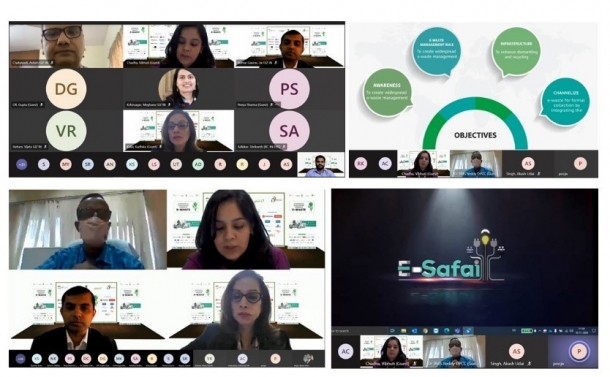RLG India & GIZ India Announce Landmark E-waste Management Project ‘E-Safai’

- Three-year public-private partnership project to build and spread awareness of transformative e-waste management techniques across India
This three-year long Development Public Private Partnership Project, also known as “Setting Up Innovative Value Chain for e-waste management” is being supported by the German Federal Ministry for Economic Cooperation and Development (BMZ). The primary objective of this landmark program is to cultivate awareness regarding safe and sustainable handling of e-waste among various stakeholders, including Resident Welfare Associations (RWAs), schools, retailers and bulk consumers.
Additionally, the program will focus on the integration of the informal sector in formal e-waste management value chains through a series of online and on-ground campaigns in select cities starting with Delhi and Hyderabad over the next three years. The project is expected to provide strong support in channelizing e-waste for formal recycling and disposal with the involvement of the informal sector and strengthen the recycling and disposal infrastructure by capacity building of the informal sector and potential entrepreneurs. Lastly, the initiative is expected to provide policy advisory pertaining to enhancing the country’s e-waste management ecosystem.
During the tenure of the project, in the select cities, RLG India and GIZ India will aid in establishing two recycling plants, 90 e-waste bins, as well as four collection centers (two each in Delhi and Hyderabad). The companies expect generating 1,000+ employment opportunities across the collection, dismantling and recycling processes. E-Safai is expected to have an audience outreach of 0.3 million people through a series of online and on-ground campaigns.
Talking of this path-breaking collaboration at the virtual launch, Ms. Radhika Kalia, Managing Director, RLG India, said, “E-Safai is yet another step in our consistent and continuous efforts to create an efficient e-waste management ecosystem to deal with this growing global challenge. This initiative is an inclusive approach to work in a balanced manner with all the stakeholders such as producers, recyclers/dismantlers, consumers, and retailers. The idea is to support effective and safe e-waste recycling by actively engaging with the informal sector, and more importantly, absorbing/formalizing it in the formal e-waste value chain through capacity building.”
Dr. Ashish Chaturvedi, Director-Climate Change and Circular Economy, GIZ-India, shared deep insights into how this project is expected to change the e-waste management landscape in India. He elucidated, “The e-waste management sector has huge unrealized potential in terms of secondary resource recovery as the critical materials present in e-waste, if properly recovered, can be used for manufacturing new products in India, leading to a reduction in imports dependency. Furthermore, the formal recycling sector has the potential of generating significant number of employment opportunities, that can be further increased with the formalization of the informal segment. With support from all stakeholders, we are confident that E-Safai will be able to achieve its goals and contribute to strengthening the e-waste management ecosystem in India.”
Gracing the event, Dr. Sandip Chatterjee, Director and Scientist F, Ministry of Electronics and Information Technology (MEITY), offered his wholehearted support for the ‘E-Safai‘ initiative. He spoke about the various initiatives relating to e-waste management undertaken by the ministry, Dr. Chatterjee mentioned, “The MEITY has successfully implemented a PAN India Awareness Programme during 2015-2020, across 31 identified states and Union territories, that apprised the public about the hazards of e-waste recycling in unorganized sector and alternate disposing methods.” He further emphasised that MEITY has also developed a low-cost recycling process and affordable machines for recyclers and a dedicated Centre of Excellence at the Centre for Materials for Electronics Technology (C-MET), Hyderabad is engaged in disseminating this knowledge base to the start-ups.
Dr. Dharmendra Kumar Gupta, Scientist ‘F’, Senior Director, Hazardous Substances Management (HSM) Division, Ministry of Environment, Forests and Climate Change, was the keynote speaker at the event. He elucidated on the serious health impacts of existing unscientific dismantling practices of e-waste handling in India. He also strongly emphasized the need for close collaborative efforts among Central Ministries, Central Pollution Control Board (CPCB), State Pollution Control Boards (SPCBs), Civil Society Organisations, Producer Responsibility Organization (PRO) and Urban Local Bodies (ULBs) for successful implementation of the e-waste management rules and for spreading awareness about the relevance of this matter.